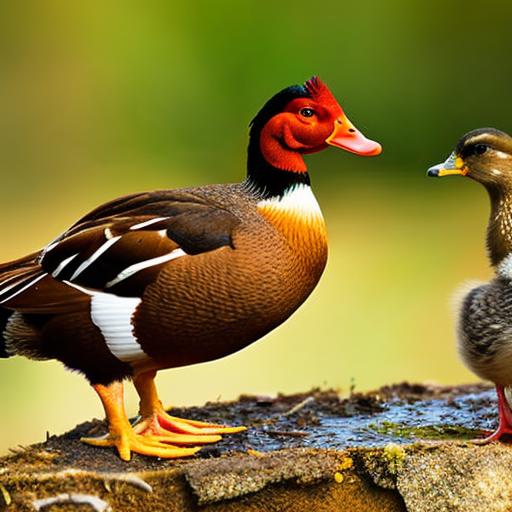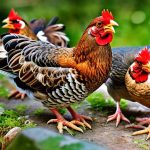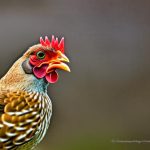Keeping ducks and chickens together can be a great way to diversify your flock and maximize your backyard space. Ducks and chickens have different behaviors and characteristics, so it’s important to understand the dynamics of keeping them together. While there are challenges that come with mixing these two types of birds, with proper planning and management, they can coexist peacefully and even form bonds.
Key Takeaways
- Ducks and chickens have different behaviors and characteristics that need to be considered before keeping them together.
- Keeping ducks and chickens together can have pros and cons, such as increased pest control but also potential health risks.
- Factors to consider before keeping ducks and chickens together include space, predator protection, and compatibility.
- Housing requirements for ducks and chickens should provide separate areas for nesting and roosting.
- Feeding and watering needs of ducks and chickens differ, and should be accommodated accordingly.
Differences in Behavior and Characteristics between Ducks and Chickens
Ducks are more aquatic birds and require access to water for swimming and cleaning. They have webbed feet that make them excellent swimmers, and they enjoy splashing around in ponds or pools. On the other hand, chickens are more terrestrial birds and prefer to stay on dry land. They do not require access to water for swimming, but they do need clean water for drinking.
In terms of noise level, ducks are generally quieter than chickens. Chickens are known for their loud cackling and crowing, especially in the morning when they lay eggs. Ducks, on the other hand, have a softer quack that is less likely to disturb neighbors. However, ducks can be messier and more destructive than chickens. They have a tendency to dig up plants and create muddy areas around water sources.
Pros and Cons of Keeping Ducks and Chickens Together
There are several pros to keeping ducks and chickens together. Firstly, they can coexist peacefully and even form bonds. Ducks and chickens have been known to groom each other and share nesting areas. Secondly, having both ducks and chickens in your flock can help control pests in your yard. Ducks are excellent at eating insects, slugs, and snails, while chickens can eat ticks, fleas, and other small pests.
Another advantage of keeping ducks and chickens together is the variety of eggs they can provide for your family. Ducks lay larger eggs with a richer yolk, while chickens lay smaller eggs with a milder flavor. This can add diversity to your breakfast table. Additionally, ducks and chickens can provide meat if you are interested in raising your own poultry.
However, there are also cons to consider when keeping ducks and chickens together. Firstly, they have different dietary needs. Ducks require a diet that includes more protein and less calcium than chickens. Feeding them the same food can lead to health problems. Secondly, they require different types of housing. Ducks need access to water for swimming and cleaning, so their housing should include a pond or pool. Chickens, on the other hand, need a dry, secure coop with nesting boxes and roosting perches.
Lastly, there is a risk of disease transmission between ducks and chickens. They can carry and transmit diseases to each other, so it’s important to keep their living areas clean and separate. Ducks can carry parasites that can infect chickens, while chickens can carry diseases like avian influenza that can be deadly to ducks.
Factors to Consider Before Keeping Ducks and Chickens Together
Before deciding to keep ducks and chickens together, there are several factors to consider. Firstly, do you have enough space for both types of birds? Ducks require more space than chickens due to their need for water access. They also need enough space to roam and forage. Secondly, are you prepared to provide separate housing and feeding areas? Ducks and chickens have different housing requirements, so it’s important to have separate areas for them.
Lastly, do you have a plan for managing potential health risks? Disease transmission is a concern when keeping ducks and chickens together. It’s important to have a plan in place for keeping their living areas clean and preventing the spread of diseases. This may include regular cleaning and disinfection of their housing, as well as monitoring their health regularly.
Housing Requirements for Ducks and Chickens
When it comes to housing, ducks and chickens have different requirements. Ducks require access to water for swimming and cleaning, so their housing should include a pond or pool. This can be a natural pond or an artificial pool. It’s important to provide enough space for them to swim and splash around.
Chickens, on the other hand, need a dry, secure coop with nesting boxes and roosting perches. The coop should be well-ventilated and predator-proof. It’s important to provide enough space for each chicken to roost comfortably and lay eggs in the nesting boxes.
It’s also important to provide separate areas for feeding and watering to prevent competition and potential aggression. Ducks and chickens have different feeding habits, so it’s best to provide separate feeders for each type of bird. This will ensure that they have access to the appropriate food and prevent any conflicts over resources.
Feeding and Watering Needs of Ducks and Chickens

Ducks and chickens have different dietary needs, so it’s important to provide them with the appropriate food. Ducks require a diet that includes more protein and less calcium than chickens. They need a higher protein content to support their growth and egg production. It’s best to feed them a commercial duck feed or a mix of grains, legumes, and insects.
Chickens, on the other hand, need access to grit to help them digest their food. Grit is small stones or pebbles that they swallow to help grind up their food in their gizzard. It’s important to provide them with a separate container of grit so they can access it as needed.
Both ducks and chickens need access to clean water at all times. Ducks require water for swimming and cleaning, while chickens need water for drinking. It’s important to provide fresh, clean water in containers that are suitable for each type of bird. Ducks may require a larger container or a pond, while chickens can drink from smaller waterers.
Health Concerns and Risks of Keeping Ducks and Chickens Together
One of the main concerns when keeping ducks and chickens together is the risk of disease transmission. They can carry and transmit diseases to each other, so it’s important to take precautions to prevent the spread of diseases. This includes keeping their living areas clean and separate.
Ducks can carry parasites that can infect chickens. They can also carry diseases like duck viral enteritis and botulism. It’s important to regularly clean and disinfect their housing, as well as provide them with clean water sources.
Chickens, on the other hand, can carry diseases like avian influenza that can be deadly to ducks. It’s important to monitor their health regularly and isolate any sick birds to prevent the spread of diseases.
Managing Flock Dynamics: Ensuring Harmony between Ducks and Chickens
To ensure harmony between ducks and chickens, it’s important to manage their flock dynamics. Firstly, introduce new birds slowly and carefully to prevent aggression. Ducks and chickens may need time to adjust to each other’s presence, so it’s best to introduce them gradually.
Secondly, provide plenty of space and resources to prevent competition. Ducks and chickens have different feeding habits, so it’s important to provide separate feeders for each type of bird. This will prevent any conflicts over food resources. It’s also important to provide enough space for each bird to roam and forage comfortably.
Lastly, monitor your flock regularly for signs of illness or injury. Ducks and chickens can be susceptible to various health issues, so it’s important to keep an eye out for any changes in behavior or appearance. If you notice any signs of illness or injury, it’s best to isolate the affected bird and seek veterinary care if necessary.
Tips for Raising Ducks and Chickens Together
Here are some tips for raising ducks and chickens together:
1. Provide plenty of space and resources for both types of birds. This includes separate housing, feeding areas, and water sources.
2. Keep their living areas clean and separate to prevent disease transmission. Regularly clean and disinfect their housing, as well as provide them with clean water sources.
3. Monitor your flock regularly for signs of illness or injury. If you notice any changes in behavior or appearance, isolate the affected bird and seek veterinary care if necessary.
4. Provide a varied diet that meets the specific needs of each type of bird. Ducks require more protein and less calcium than chickens, so it’s important to feed them accordingly.
5. Introduce new birds slowly and carefully to prevent aggression. Give them time to adjust to each other’s presence before allowing them to interact freely.
Is Keeping Ducks and Chickens Together Right for You?
Keeping ducks and chickens together can be a rewarding experience, but it requires careful planning and management. It’s important to consider the pros and cons, as well as the specific needs of each type of bird, before deciding if it’s right for you. With proper housing, feeding, and monitoring, ducks and chickens can coexist peacefully and provide a variety of benefits for your backyard flock.
If you’re considering keeping ducks and chickens together, you may be wondering if it’s possible to house them in the same coop. While it is generally not recommended to keep ducks and chickens together due to their different needs and behaviors, there are some instances where it can work. However, it’s important to provide adequate space and separate areas for each species. To learn more about where to put your chicken coop and how to design it for optimal functionality, check out this informative article on Poultry Wizard: Where to Put Your Chicken Coop.
FAQs
What is the article about?
The article is about whether it is possible to keep a duck with chickens.
Can ducks and chickens live together?
Yes, ducks and chickens can live together.
Is it safe to keep ducks and chickens together?
Yes, it is safe to keep ducks and chickens together as long as they are provided with adequate space, food, and water.
Do ducks and chickens have different dietary needs?
Yes, ducks and chickens have different dietary needs. Ducks require more niacin and less protein than chickens.
What are the benefits of keeping ducks and chickens together?
Keeping ducks and chickens together can provide benefits such as pest control, increased egg production, and companionship for the animals.
What are the potential drawbacks of keeping ducks and chickens together?
Potential drawbacks of keeping ducks and chickens together include the risk of disease transmission, the need for separate housing during breeding season, and the possibility of ducks being too messy for some chicken keepers.
What should be considered before keeping ducks and chickens together?
Before keeping ducks and chickens together, it is important to consider the space requirements, dietary needs, and potential drawbacks. It is also important to research and understand the behavior of both animals.
Meet Walter, the feathered-friend fanatic of Florida! Nestled in the sunshine state, Walter struts through life with his feathered companions, clucking his way to happiness. With a coop that’s fancier than a five-star hotel, he’s the Don Juan of the chicken world. When he’s not teaching his hens to do the cha-cha, you’ll find him in a heated debate with his prized rooster, Sir Clucks-a-Lot. Walter’s poultry passion is no yolk; he’s the sunny-side-up guy you never knew you needed in your flock of friends!







